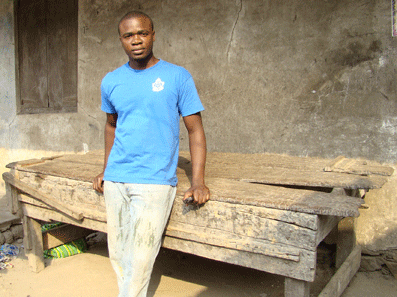Designing coffins seems like a gloomy task, but Eric Anang — who is completing a residency this fall at University of Wisconsin — uses the family art form to make a statement.
Anang said his grandfather ran the Kane Kwei Carpentry Workshop in Ghana until his death in 1992. Anang’s father and brother then took over the shop, which then led to his exposure to the creative art form.
Anang first started working on coffins at age 12, when he began to join the apprentices in the shop after he would finish his day at school.
But Anang said being a coffin designer in Ghana isn’t an easy profession. Once a family chooses a coffin, he only has between a week and a month to finish the project — leaving little time for creativity.
“We have to work quickly to make it go fast, so I only have the opportunity to build things on my own in a different way when I have residencies like I do now in Madison,” Anang said.
In his latest project, Anang will be constructing a coffin in the form of a broken gun, an idea he had after his first experience with a firearm, in addition to the school shootings across the country. When Anang’s friend took him to a gun range last year, his friend purchased around five to eight guns. Scared, Anang said it made him aware of how easy it is to obtain a firearm in the U.S.
Then, after hearing about the death of Tony Robinson, Anang said he was inspired to dedicate his latest project to the slain teenager.
Tony Robinson’s death: a portrait of a life ended, a life halted, a community united
Anang said when he’s finished, he wants to organize a parade with the Black Lives Matter movement to showcase the piece. He will also be making a list of school shootings that have happened in the U.S. since 2000 and putting them on the broken gun.
Anang said he’s crafted more light-hearted coffins in the past, but as an artist, he feels it’s his responsibility to address “the issues.”
“It might be a little sensitive, but sometimes you need people to press that red button first,” he said. “And that’s basically what I’m going to do here.”
Comparing his time in Ghana to places in the U.S. where he completes residencies, Anang said the environment greatly impacts his work. In Ghana he has to work under high demand and tight deadlines, but in Madison, he is able to take his time.
He finds that working when he’s relaxed and in a good mood makes him more productive, but he said a friendly environment isn’t always a given circumstance.
Anang, who worked in Philadelphia last year, said he had difficulty adjusting to the city.
Philadelphia has a large black population, but Anang’s excitement to be around those he could identify with was not matched by black citizens in the city of brotherly love.
In Madison, however, Anang said the tone is different and he finds the hospitality and welcoming nature of UW more positive, which has allowed him to find a second home here in Madison.














